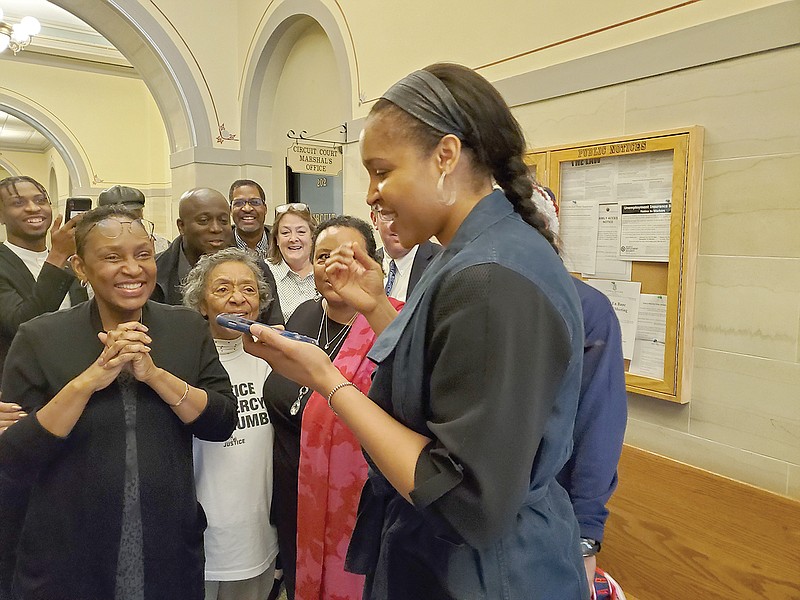Cole County Judge Dan Green on Monday vacated the convictions of a St. Louis man accused in a 1997 burglary and shooting in the St. Louis area.
The announcement, following a brief hearing, brought cheers from family and supporters of Jonathan Irons.
Irons, who has been serving a 50-year prison sentence, had been arguing to get his case reopened via a civil suit he filed against the Missouri Department of Corrections in 2018 in Cole County.
Irons has gotten national attention, in part due to his efforts being supported by Maya Moore, a Jefferson City native who stepped away from her career in the WNBA last year to spend time helping Irons, who is a family friend, get his conviction overturned.
Moore announced in January she doesn't plan to play professional basketball this season and will continue to help with Irons' case.
Irons has been incarcerated for 23 years after his conviction in the non-fatal shooting of a homeowner during a burglary.
After Monday's court hearing, Moore got in touch with Irons from state prison. When he answered the phone, Moore and a group of supporters loudly cheered to let Irons know the judge had ruled in his favor. Irons thanked his supporters and even broke into song at one point.
Green's order states Irons could be discharged from custody unless the St. Charles County prosecutor's office elects, within 30 days of the judge's order, to retry Irons on these charges.
Green's order is also stayed, pending a review by the Missouri Attorney General's Office, who argued to keep Irons in prison, as they could decide to take the case to the Western District Court of Appeals in Kansas City.
Chris Nuelle, a spokesman for the Missouri Attorney General's Office, said Monday the office was reviewing the judge's order and wouldn't have any further comment on the case.
In October, Moore was in Green's courtroom as Irons' defense team called several witnesses, including an independent investigator and an eyewitness identification expert, who said they had examined available records and there was no physical evidence such as DNA, fingerprints or footprints linking Irons to the crime.
Irons, who was 16 at the time of the crime, had been seen in O'Fallon the evening of Jan. 14, 1997, with a gun, according to court records.
The victim returned home and confronted a burglar. Shots were fired, and the victim was hit in the right temple. A week later, Irons was arrested. The detective in the case said Irons had confessed, but the detective wasn't available to be cross-examined at trial because he was ill; he has since died.
During the October hearing, Irons took the stand in his own defense.
At the time the crime occurred, Irons was selling marijuana. When he was picked up by authorities, he thought it was for illegal drugs. Irons said he did not hear he was being charged with the burglary and shooting until his first court appearance. His defense has argued the detective in the case tried to make him admit to the crime during an interrogation after his arrest, and he was never read his rights.
Much of the testimony in October was based around fingerprint evidence. Irons' defense claimed several of the fingerprints found at the crime scene matched the victim. However, the attorneys said, none matched Irons, and one was never identified.
Irons' lawyers wanted the Highway Patrol to test the print from the unknown person, thinking it could lead to the person who actually committed the crime.
Green allowed for this to happen. However, in February, the patrol determined digital images of the fingerprints were unsuitable for a comparison search in the Automated Fingerprint Identification System database.
Lawyers for the attorney general, representing the Department of Corrections, argued Irons should remain in prison and said they had evidence showing Irons' defense team at the time had all the information they needed to properly defend their client.
Kansas City attorney Kent Gipson, who defended Irons in his suit, said, "It's sad that it's a lot harder to get a conviction overturned than it is to obtain one in the first place. It's not unusual to happen as long as 25 years after the fact."
Gipson said Irons would probably not be able to get out of prison for at least a couple of weeks.
An emotional Moore said, "It doesn't feel real. It's sad that it has taken this long for us to get to this point and he's still not home yet. We're happy, though, that the truth is out there."
As far as what's next for her future, Moore said she is focused on making sure Irons gets out of prison.
"We're still fighting because he is still behind bars, but we hope that the momentum and the commitment we've had for truth in this case, from Jonathan, to our lawyers, to our family, we hope inspires others and inspires change along with accountability and prosecutorial reform," Moore said. "This is something that didn't have to happen."
This article was edited at 11:35 a.m. March 10, 2020, to correct the spelling of Chris Nuelle's name.

